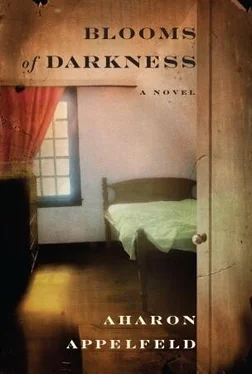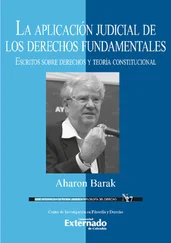Now her spirits are high. She is singing and joking, and she calls the Jews good and delicate creatures whose lives were spoiled by mental confusion. Even Sigmund, who was as addicted to his liquor as a Ukrainian, even he didn’t know how to shake off niggling thoughts. Now I won’t think , he would say to himself. Now I’m giving myself over to the caprice of my heart . “More than once I begged him, ‘Sigmund, call out loud, God is in heaven. You don’t know how much good that will do you.’ Hearing my request, he would burst out laughing, as if I’d said something foolish. He never agreed to admit that God exists. He kept saying, ‘How do you know? If you give me one little proof, I’ll start to believe.’ ‘The soul,’ I kept saying, ‘doesn’t your soul announce to you that God exists?’ And what was his answer? ‘Even the existence of the soul needs proof.’ That’s why I say, the Jews can’t live without proof.
“But you, my sweet, you already know that there’s no need for proofs. You just have to direct your soul in the correct manner. Faith is a simple matter. If you believe in God, you’ll see a lot of beauty. And another thing, don’t use the word ‘contradiction.’ Sigmund used to say to me sometimes, ‘There’s a contradiction in what you’re saying.’ I loved every word that came out of his mouth, but not that word. I often tried to uproot that strange word from his head, but he stood his ground. I hoped that at least in his drunkenness, he would discover and admit that God exists. But all my efforts were in vain.”
These reminiscences don’t make them sad. Mariana and Hugo make love as though they were in a wide double bed, not an abandoned storage shed. Hugo again promises that he will always be with her, in good and bad times.
“In a little while your mother will come and take you away from me,” Mariana says.
“The war isn’t over yet.”
“The war will be over soon, and they’ll do to Mariana what they did to the Jews.”
“You’re exaggerating.” He allows himself to correct her.
“Realistic predictions don’t exaggerate, they show you what will be. You have to be alert and listen to them. Don’t be afraid, darling, Mariana’s not afraid of death. Death isn’t as horrible as it’s described. You pass from this world to a better one. True, there is a heavenly court, but you should know that it takes not only deeds into account but also intentions. Do you understand?”
The rain, which seemed to be determined and angry just a while ago, stops all at once. The sun comes out again, and the fields are spread out, flat and broad. The isolated trees in the heart of the plain look like forgotten signposts from another age.
Later Hugo falls asleep. He barely hears the last words that Mariana says. He sleeps and dreams many dreams, but all he remembers is his mother’s face. His mother was in the pharmacy, completely absorbed in the effort to decipher a prescription that had been handed to her. It was noon, just before the pharmacy closed for lunch. At that hour the pharmacy was usually full. His father was in the adjacent room, mixing a prescription for a customer. That familiar picture, of which Hugo knew every detail, made him happy. He expected his mother to notice him and be surprised. But although she was apparently aware of him, she didn’t pay him any notice. For a long time Hugo stood and wondered why. Finally he decided, If they’re ignoring me, I’ll be on my way .
The sun is setting, and again the nagging question arises. “Where will we sleep?” Mariana knocks on several doors, but no one is willing to let them stay the night. In the tavern, she is immediately recognized, and everyone mocks and curses her. Mariana isn’t silent. She calls them adulterers and sanctimonious men who lord it over the weak. “The time will come, and it’s not far away, when God will punish you. God doesn’t forgive adultery or self-righteousness. He adds punishment upon punishment.”
Again they are in the depths of darkness. Mariana is full of brandy and calls out loud, “I love the night. The night is better than people and their houses.” Hugo rushes to gather twigs. They light a fire, boil water in the pot, and put some potatoes in the fire.
They eat the remainder of the cheese and a piece of the sausage, and Mariana gives her imagination free reign: “I foresee days when we’ll have plenty; poverty doesn’t suit us. I see a small house, a vegetable garden, an orchard. We’ll milk the cow, but we won’t slaughter her. We’ll spend most of the day in nature, and in the evening we’ll come home and light the oven. I love a lit oven, when you can see the flames in it. That’s all, nothing more. Wait a moment, I forgot the main thing — a bathtub. In our house there has to be a bathtub. Without a bathtub, life isn’t life. You have to lie in the bathtub for two or three hours every day. That’s the kind of life I foresee. What do you think?”
Thus they pass the first part of the night.
After midnight, when they’re already half frozen, they find an empty tavern whose owner agrees to let them sleep there. Mariana is drunk, and she keeps blessing the proprietor, who is not impressed by her blessings and demands payment. Mariana gives him a banknote, and he demands more. She gives him more and asks for a blanket. Hugo’s feet are as cold as ice, and Mariana rubs them briskly. In the end they wrap themselves in each other and fall asleep.
They wake up early in the morning and set out immediately. An overcast day is preferable to a moldy alcove, Mariana maintains. Fortunately they find a tree with broad branches and prepare to make a fire.
The snow is melting, and the black earth that was hidden all winter is revealed. Thin smoke rises from the chimneys atop the houses. It’s a tranquil, innocent morning. Mariana looks particularly beautiful. Her large eyes are wide open, and her long neck becomes her.
After finishing her tea, Mariana takes a few swigs from the bottle and her heart opens. “My life was ruined from the start,” she says. “I don’t want to blame my father and mother. I used to blame them and hang all the bad things that happened to me on them. Now I know, it was my youthful restlessness. I was young and beautiful, and everybody was in love with me. I didn’t know then that they were predators, that they only wanted my flesh. They taught me to drink and smoke. I was thirteen, fourteen, stunned by the money they gave me. I was sure things would go on that way all my life. I didn’t know they were poisoning me. At fourteen, I already couldn’t manage without brandy. My parents shunned me. They wouldn’t even let me into the house. ‘You’re lost,’ they told me, and I was sure that they were evil and would relent. After that — from whorehouse to whorehouse, from madam to madam. Why am I telling you all this? I’m telling you so that you’ll know that Mariana’s life was ruined from the start. Now it’s impossible to fix it.”
“Why?”
“Because a large part of my body has been ravished. The wolves ravished it. I don’t expect mercy or who knows what. The Russians say that if a woman slept with the Germans, her blood is on her head. I assume that God won’t stand by me, either. I ignored Him all those years.”
“But God is greatly merciful and forgiving.” Hugo interrupts her.
“Yes, to those who are worthy, to those who walk in His ways and do what He asks of them.”
“You love Him very much.”
“It’s a late love. For many years I rebelled against Him.”
How right she is becomes clear that very day. People attack them wherever they go. They throw stones at them, call them bad names, and sic big dogs on them. Mariana protects them from the dogs with a stick, and she curses the people loudly. They call her “servant of the Germans,” and she calls them “hypocrites” and “bastards.” They wound her neck, which heightens her anger and frees her tongue.
Читать дальше












